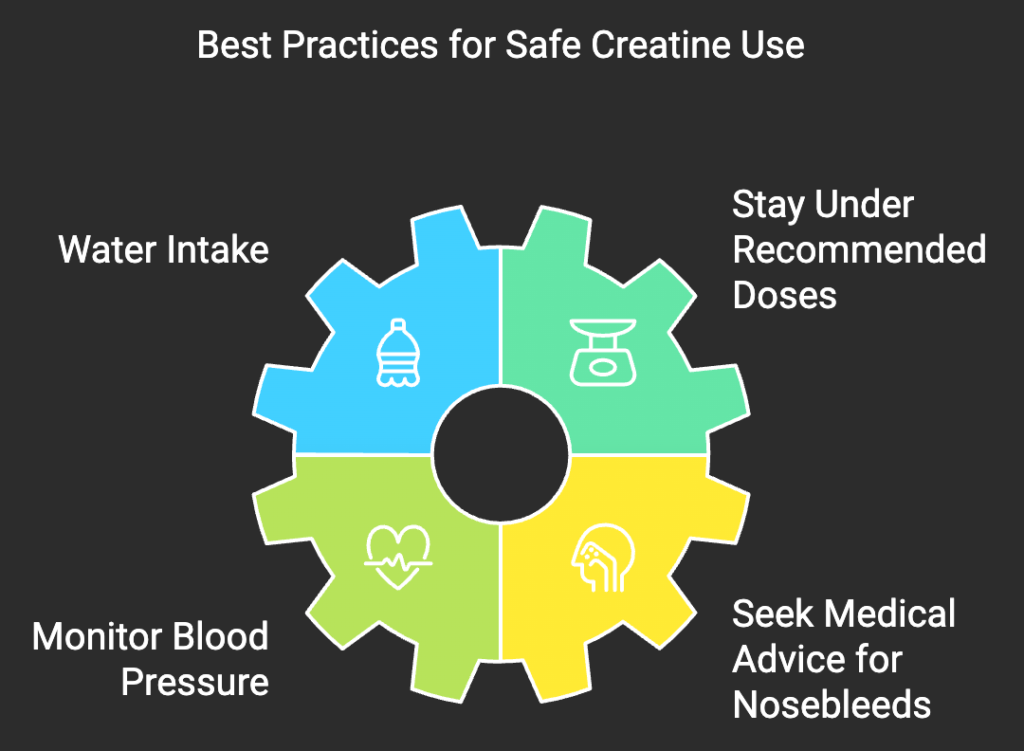There is no doubt that creatine supplements are famous for increasing performance by enhancing muscle mass, and energy levels during high-intensity exercises. Creatine is considered one of the safest supplements, however, there is a common question asked by fitness enthusiasts concerning creatine and that is, “Does creatine cause nosebleeds?”. In this article, I will explore what the studies indicate about whether or not these fears are justified.
Understanding the Relationship Between Creatine and Nosebleeds
What Are Nosebleeds (Epistaxis)?
When blood vessels inside the nose are broken, they cause the nose to bleed. It is common to have nosebleeds or epistaxis. Most nosebleeds are harmless and will stop, by, themselves without treatment within 30 minutes. However, excessive or severe nosebleeds could suggest health problems such as hypertension, blood clotting disorders, or environmental factors like dry air.
The Link Between Creatine and Nosebleeds: What Does Science Say?
Blood Pressure and Creatine Use
There is a saying that if you take creatine, your nose will bleed. The possible reason for creatine use and nosebleeds may be due to blood pressure. Perhaps by enlarging muscle mass and increasing general energy needs, creatine could bring about minor elevations in blood pressure, particularly when the user is physically active. Such elevated blood pressure might strain the tiny capillaries in your nose to the breaking point.
On the other hand, research into creatine use and blood pressure has produced contradictory results. Some studies indicate that creatine has no major effect on blood pressure in healthy individuals and others show rises in blood pressure especially taken at higher doses. The mixed findings highlight the importance of monitoring blood pressure for those taking creatine, particularly, people whose blood pressure is already high.
Key takeaway: People with high blood pressure should be careful with creatine. For most others, the risk is unclear and likely small.
Dehydration and Nosebleeds
Dehydration may be another common contributing factor between creatine and nosebleeds. The water retention in muscles caused by creatine could lead to dehydration if users don’t drink enough fluids. Dehydration can cramp up our nasal passages and make blood vessels more fragile, increasing the likelihood of nosebleeds.
Key takeaway: Drinking enough water when taking creatine can indirectly reduce the chances of nosebleeds.
If you are, unsure of how much water to drink when you are on creatine supplements, then I’d recommend reading the article, “How Much Water Should I Drink If Taking Creatine?”.
Blood Vessel Health
Certain people believe that creatine could influence the small cells of our blood vessels, perhaps causing more rapid clotting or weakening of the vessels. This can worsen the nose bleeds.
But the thing is that we do not have enough accurate pieces of evidence. There are no definitive studies that provide a link between creatine use to increased clotting. It’s just an idea for now. We require additional research to make sure that it is something to be concerned about.
Key takeaway: The impact of creatine use on our blood vessel health should not concern you too much, as there is not enough proof for serious worry just yet.
Best Practices for Creatine Users to Minimize Side Effects
Here are some of the best practices, you can follow for maximum benefit from creatine supplementation and avoid side effects like dehydration and nosebleeds.
Water Intake
Since creatine pulls water into the muscles, your fluid intake should be more so that your body has enough water.
Stay Under Recommended Doses
The general guideline is to undergo a loading phase of 20 grams per day (taken in smaller doses throughout the day) for 5-7 days, followed by a maintenance dose of 3-5 grams, per day. Too much of a good thing can increase the likelihood of side effects.
Monitor Blood Pressure
Just like I said before, if you have a history of hypertension or cardiovascular issues, the use of creatine may increase blood pressure and it is recommended that you have your blood pressure monitored.
Seek Advice from a Medical Professional if You Suffer Nosebleeds
Repeated nosebleeds are not generally related to creatine intolerance but are suggestive of a more serious health concern and you need specialist advice. If you are suffering from frequent nosebleeds, go see your doctor and test for any disease such as clotting or blood pressure before blaming it on creatine.
There is no solid proof that creatine supplements cause more nosebleeds. However, nosebleeds are more likely to occur in people who are already prone to them or have conditions like high blood pressure or dehydration.
Most individuals can safely consume a moderate amount of creatine regularly, but those with certain health issues (in particular high blood pressure or a history of frequent nosebleeds) ought to consult their physician before trying creatine supplements. Remember, as with all supplement use, it is best to consult your healthcare professional when managing your health and fitness regime.

Conclusion: Does Creatine Cause Nosebleeds?
Currently, there is no conclusive scientific evidence that suggests that creatine supplementation can raise the risk of nosebleeds. Having said this, side effects like dehydration or slightly raised blood pressure can create conditions that could make nosebleeds more likely in those predisposed to them.
Creatine is generally safe for most people to take, in the recommended dosages however if you already have any existing medical condition especially someone with hypertension or recurrent nosebleeds then it would be best to check with a healthcare professional before starting on creatine supplements. You should always consult your physician because personalized medical advice is essential.
Frequently Asked Question
Does creatine cause nosebleeds?
There is, no conclusive scientific evidence that suggests that creatine supplementation can raise the risk of nosebleeds.
How can creatine cause dehydration, and could that lead to nosebleeds?
Since creatine draws water into our muscles this can lead to dehydration and can, weaken blood vessels causing them to break resulting in nosebleeds.
Should I stop using creatine if I experience nosebleeds?
Repeated nosebleeds are not generally related to creatine intolerance but, are suggestive of a more serious health concern and, therefore you need to consult your doctor before resuming your creatine supplementation.
Are there specific conditions that increase the risk of nosebleeds while using creatine?
Nosebleeds are more likely to occur in people who, are already prone to them or have conditions like high blood pressure or dehydration.
How can I safely use creatine to minimize side effects like dehydration?
When you take creatine it is beneficial to drink, more water throughout the day, particularly before and after your workout. Proper hydration will help you, better balance your body’s fluid levels so side effects such as nosebleeds and muscle cramps can be avoided.

